When you switch from a brand-name pill to a generic version, your body doesn’t change. The active ingredient is the same. The FDA requires generics to match brand drugs in strength, dosage, and absorption. So why do so many people swear their generic medication just doesn’t work as well?
It’s Not the Drug - It’s Your Brain
The answer lies in something called the placebo effect - not as a trick, but as a real, measurable biological response. Your brain expects a certain outcome based on what you believe. If you think a pill is expensive, well-known, or "better," your brain activates pathways that actually reduce pain, ease anxiety, or lower blood pressure. That’s not imagination. That’s neuroscience.A 2014 study published in Health Psychology showed this clearly. Researchers gave people identical placebo pills - no active ingredient at all - but labeled one set as a brand-name painkiller and the other as a generic. The brand-labeled placebos reduced headache pain almost as much as real ibuprofen. The generic-labeled ones? Half the effect. The pills were the same. The only difference was the label.
Brain scans confirmed it. When people believed they were taking a brand-name drug, their dorsolateral prefrontal cortex - the area tied to expectation and reward - lit up 27% more than when they thought they were taking a generic. That extra brain activity translated into real pain relief. Your mind isn’t fooling you. It’s helping you.
Generics Work - But Your Belief Changes Everything
The FDA requires generic drugs to be bioequivalent to their brand-name counterparts. That means they must deliver the same amount of medicine into your bloodstream within the same timeframe - within a 90% confidence interval of 80% to 125% of the brand. That’s not a loophole. That’s a strict standard. Millions of people take generics every day with no issues.Yet, nearly one in three patients still believe generics are weaker. This isn’t just a myth - it’s a clinical problem. In antidepressant trials, patients switched from brand-name sertraline to its generic version reported higher dropout rates - not because the drug failed, but because they felt it did. In statin trials, patients told they were taking a generic reported muscle pain at nearly three times the rate of those told they were taking a brand, even though both groups got identical placebos.
And it gets worse. When patients believe they’re on a cheaper drug, they’re more likely to skip doses, stop taking it altogether, or blame the medication for side effects that aren’t even there. This is called the nocebo effect - the dark twin of the placebo effect. It’s not laziness. It’s psychology.
Price Tells Your Brain What to Expect
Your brain doesn’t just respond to names. It responds to price. In a 2008 study, healthy volunteers were given fake painkillers labeled as either $2.50 per pill or $0.10 per pill. Both were identical sugar pills. The $2.50 ones reduced pain by 64% more than the cheap ones. The same people, given the same pills, had different outcomes - simply because of what they thought they paid.This isn’t just about greed. It’s about learned associations. We’ve been conditioned to believe that expensive = better. Advertisements, packaging, even the color and shape of pills reinforce this. Brand-name drugs often come in sleek bottles with bold logos. Generics? Plain white pills, sometimes with different colors or sizes depending on the manufacturer. That change alone can trigger a nocebo response.
The FDA noticed this. In 2023, they launched a pilot program requiring generic manufacturers to keep pill appearance consistent across batches. Why? Because changing the shape or color of a generic pill - even slightly - increased patient discontinuation rates by nearly 20%. If your brain associates a certain look with effectiveness, changing that look can make you feel like the drug stopped working.
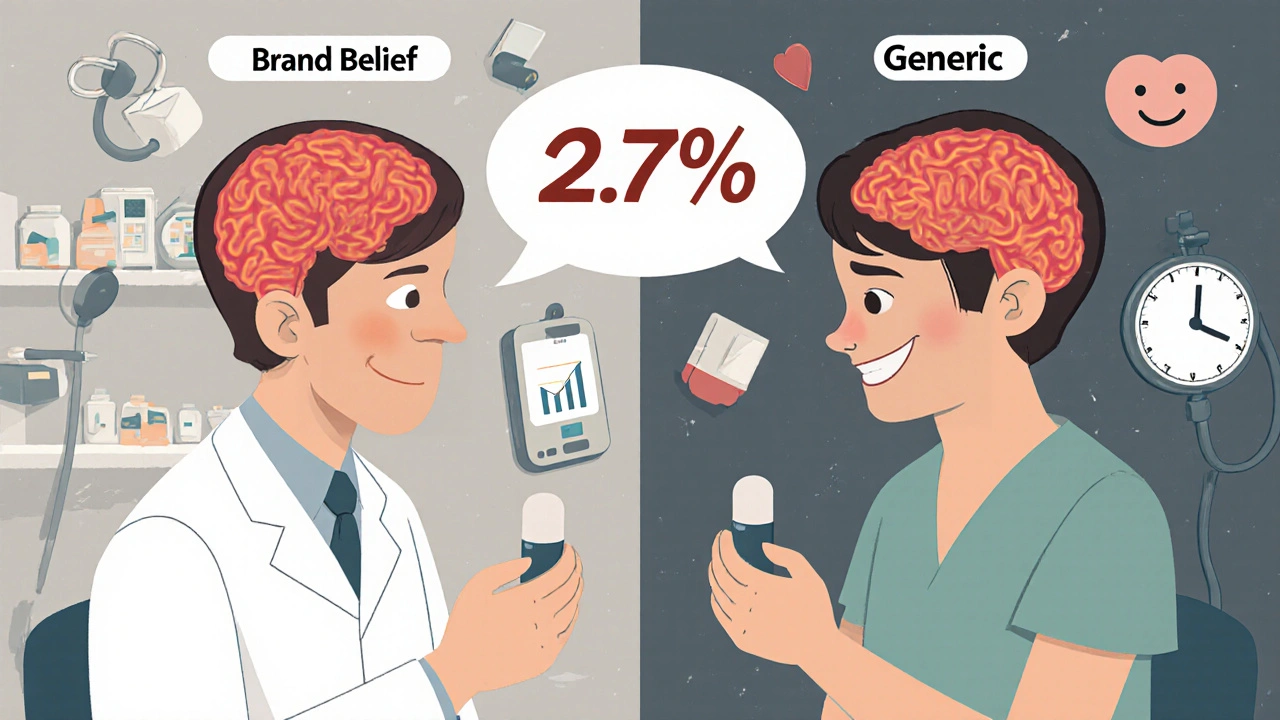
Real Stories: When the Mind Overrules the Molecule
Online forums are full of stories like this:- "I switched from brand-name levothyroxine to generic. My TSH levels were fine, but I felt exhausted, cold, and foggy. I went back to the brand - and felt normal again."
- "My doctor said generic sertraline was the same. But I felt numb. Like the joy was gone. I didn’t realize it was in my head until I read about the placebo effect."
- "I took generic lisinopril for six months. My blood pressure was perfect. Then my pharmacy switched me to a different generic. Suddenly, I got dizzy. Turned out - same drug, different filler. My brain thought it was a different pill."
These aren’t rare cases. On Drugs.com, 78% of users who switched to generics reported reduced effectiveness. On Reddit, threads about "generic not working" get hundreds of upvotes. The chemical composition is identical. But the psychological impact? Very real.
How Doctors Can Help - Without Lying
You can’t trick patients into feeling better. That’s unethical. But you can reframe their expectations - honestly and clearly.A 2021 study in JAMA Internal Medicine tested a simple 3-minute conversation between doctors and patients:
- "Generic drugs are required by the FDA to work the same as brand-name drugs. They have the same active ingredient, same dosage, and same absorption rate."
- "Sometimes, people feel like generics don’t work as well - not because they’re weaker, but because their brain expects a different result. That’s normal."
- "Give it two weeks. If you still feel off, we’ll check your levels and talk about options."
This approach reduced nocebo responses by 47%. Patients were more likely to stick with the generic. They didn’t feel lied to. They felt understood.
Doctors trained in this method saw 32% higher adherence rates. It’s not magic. It’s communication.
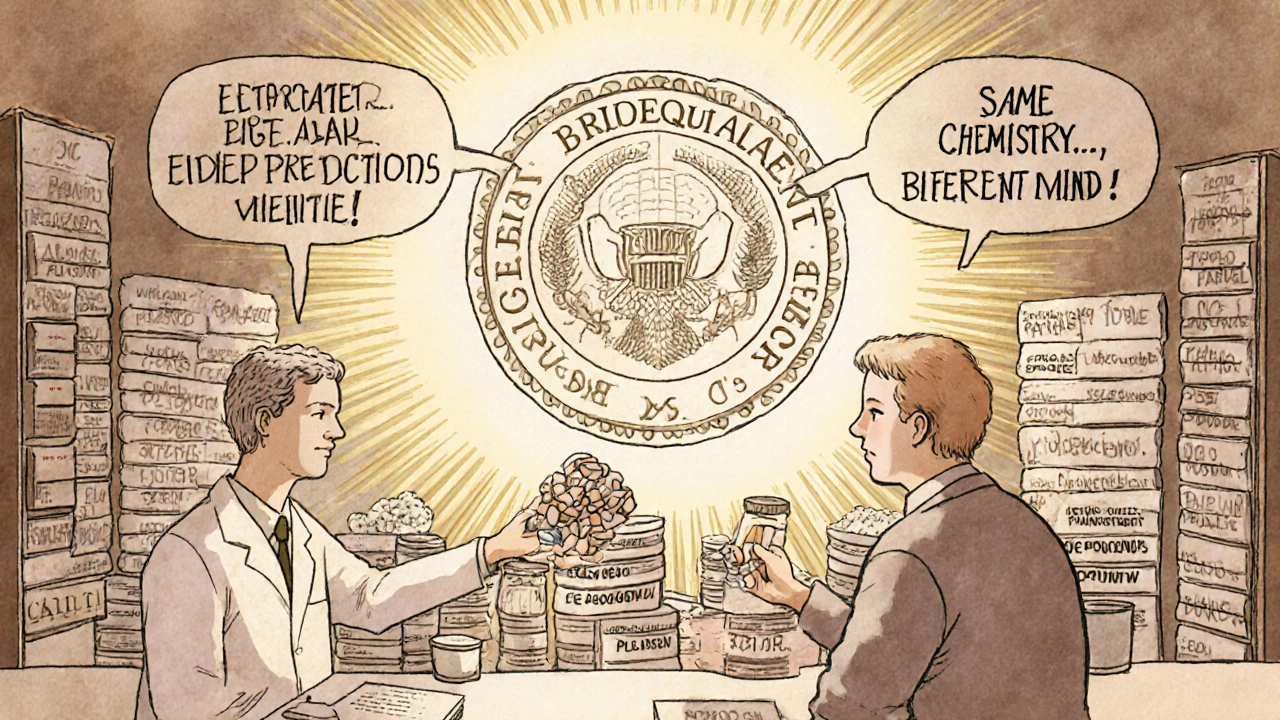
What You Can Do - Even If You’re Not a Doctor
You don’t need a medical degree to manage your own expectations. Here’s how:- Don’t assume cheaper means worse. Generics are not "second-rate." They’re regulated the same way. The only difference is cost - and your brain’s reaction to it.
- Track your symptoms objectively. Use a journal. Note your blood pressure, mood, energy levels before and after switching. Don’t rely on how you "feel." Numbers don’t lie.
- Give it time. Psychological adjustments take weeks. If you feel worse right after switching, wait. Your brain might just be catching up.
- Ask your pharmacist. Pharmacists know which generics have consistent pill shapes and colors. If you’re sensitive to changes, ask for the same manufacturer each time.
- Don’t self-diagnose a "reaction." If you think the generic isn’t working, talk to your doctor. Get a blood test. Don’t assume it’s the drug.
Why This Matters - Beyond Your Wallet
The psychological gap between brand and generic isn’t just personal. It’s financial. In the U.S., generics make up 90% of prescriptions but only 23% of drug spending. Yet, because of fear and mistrust, patients still pay billions extra for brand names they don’t need. Experts estimate that managing expectations could save the healthcare system $8.7 billion by 2028.It’s not about forcing people to take generics. It’s about giving them the truth - so they can choose freely. When people understand that their brain plays a role, they can work with it - not against it.
The future of medicine isn’t just better drugs. It’s better understanding. Your mind is part of your treatment. When you learn how to use it, you get more out of every pill - no matter the label.
Do generic drugs really work the same as brand-name drugs?
Yes. The FDA requires generic drugs to have the same active ingredient, strength, dosage form, and route of administration as the brand-name version. They must also be absorbed into the bloodstream at the same rate and to the same extent - within strict bioequivalence limits (80-125% of the brand). Thousands of studies and millions of patients confirm they work the same medically. The difference is cost - not chemistry.
Why do I feel different on a generic medication?
You’re likely experiencing the nocebo effect - where negative expectations lead to real physical symptoms. Your brain may associate the generic’s different color, shape, or lower price with lower quality. This doesn’t mean the drug isn’t working. It means your mind is reacting to the packaging, not the medicine. Give it two weeks. Track your symptoms. Talk to your doctor before switching back.
Can the placebo effect make a generic drug work better?
Yes - but only if you believe it will. Studies show that when people are told they’re taking a brand-name drug (even if it’s a placebo), their brain activates pathways that improve pain relief, mood, and even blood pressure. This effect is strongest in conditions like pain, depression, and anxiety. The drug doesn’t change. Your belief does. That’s why honest communication from your doctor matters.
Are there cases where generics really don’t work as well?
Rarely - and only due to manufacturing issues, not psychology. In very sensitive cases - like thyroid medication (levothyroxine) or blood thinners (warfarin) - even tiny differences in inactive ingredients can affect absorption in some individuals. But this is not the norm. If you suspect this is happening, ask your doctor for a blood test. Most people experience no difference. The vast majority of complaints are psychological.
Should I avoid switching to generics because of the placebo effect?
No. Avoiding generics because of fear costs you money and strains the healthcare system. Instead, prepare for the switch. Talk to your doctor about expectations. Give yourself time. Track your results. Most people adapt without issue. The placebo effect isn’t a reason to avoid generics - it’s a reason to understand them better.
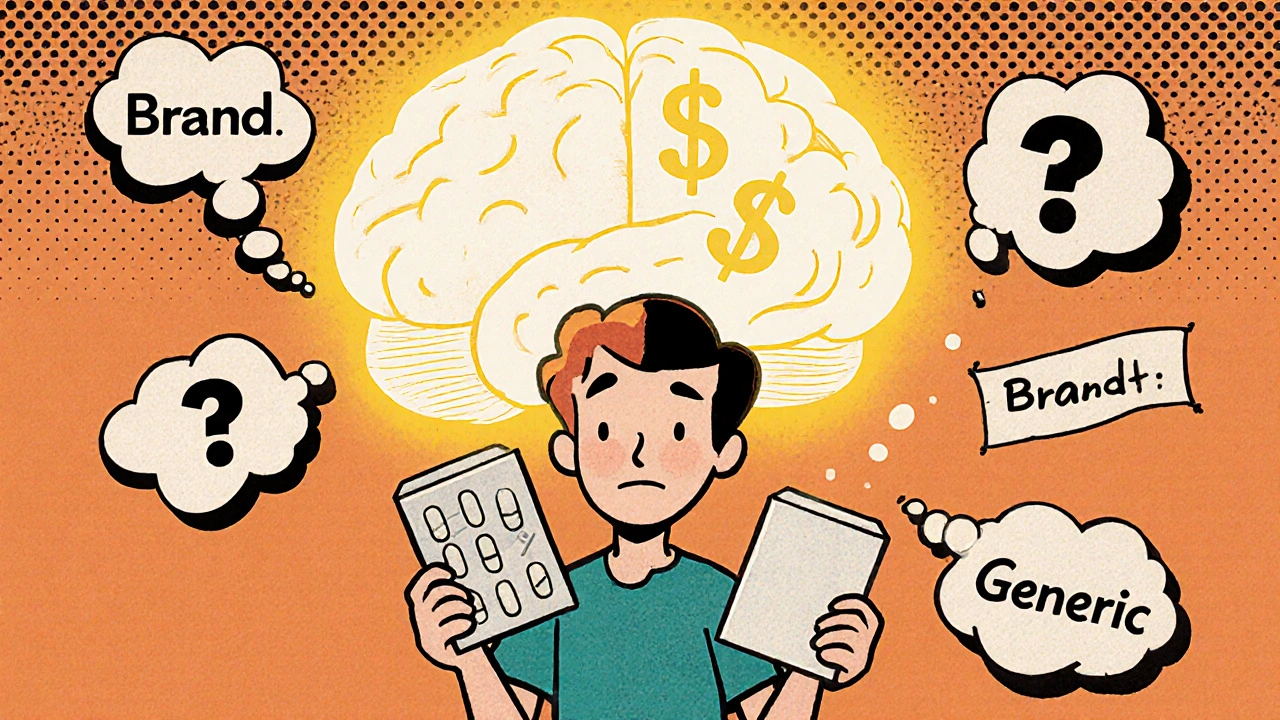
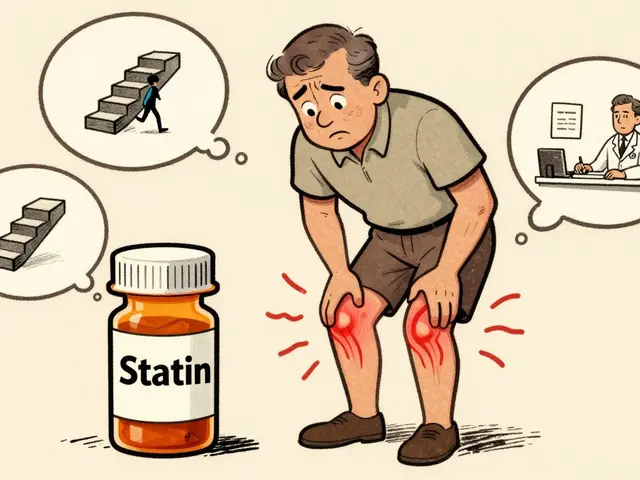
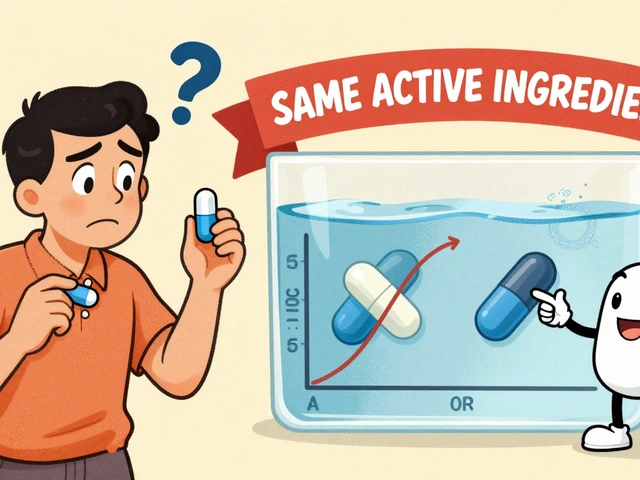
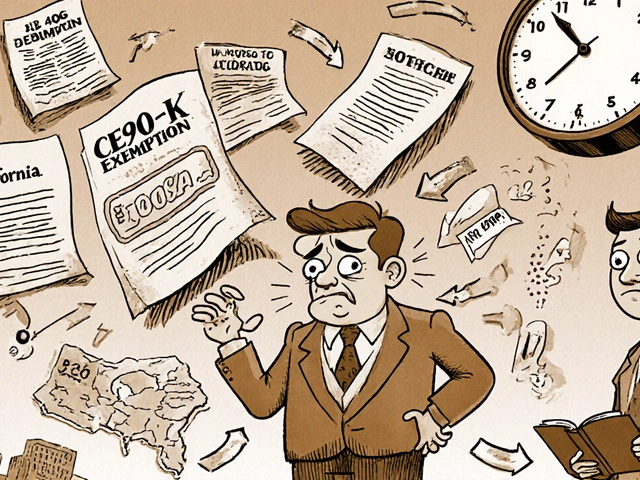

11 Comments
So let me get this straight - we’re paying $20 for a pill with a fancy logo and calling it medicine, but a $2 version with the exact same chemicals is "just not working"? 🤦♀️ Your brain is the real pharmacy here, folks.
I switched from brand to generic levothyroxine and felt like a zombie for two weeks then realized I’d been sleeping 4 hours a night and drinking 3 coffees before bed. The pill didn’t change. My habits did. Give it time and track your sleep. Seriously.
Just had this convo with my grandma last week. She swore her generic blood pressure med made her dizzy. We checked the bottle - same active ingredient, different filler. She’d been on the same brand for 15 years. When we switched her to the same generic she’d been on before (but she didn’t know), she said "oh this feels normal." Mind = blown 😅
As someone who’s been on generics for over a decade, I get it. The color change from blue to yellow feels like betrayal. But here’s the thing - your body doesn’t care about aesthetics. Your brain does. And if you’re feeling off, it’s not the drug. It’s the story you’re telling yourself about it. Try writing down how you feel before and after. You might be surprised.
It’s wild how much power perception has. I used to think generics were for people who couldn’t afford the real thing. Then I got diagnosed and had to switch. Six months later, my labs are perfect. I’m not saying it’s easy to retrain your brain - but it’s possible. And worth it.
While the psychological dimensions of pharmaceutical perception are indeed compelling, it is imperative to acknowledge that bioequivalence standards are rigorously enforced by regulatory agencies. The variance in patient-reported efficacy is not indicative of pharmacological inferiority, but rather a manifestation of conditioned cognitive bias. The dorsolateral prefrontal cortex’s differential activation, as documented in the referenced 2014 study, provides neurobiological corroboration of this phenomenon. One must, therefore, distinguish between physiological outcome and perceptual interpretation.
They’re hiding something. Big Pharma doesn’t want you to know generics are identical because then they’d lose billions. The color changes? The fillers? It’s all designed to make you feel like you’re getting less. Wake up.
I work in a clinic and see this every day. Patients panic when their pill changes color. We sit down, show them the FDA page, and say: "Your numbers don’t lie. Your feelings do." Most come back a month later saying "I didn’t realize I was just scared." You’re not broken. Your brain just needs a new script.
USA so weak. In India we take generics since 1990s and no one cry. Your brain too soft. You pay for logo not medicine. Sad. Also why you have so many pills? In India one pill for 10 problems. You Americans need to stop being babies.
Thank you for this nuanced, evidence-based exploration. The nocebo effect is profoundly under-addressed in clinical practice. I’ve observed that when patients are provided with transparent, non-patronizing explanations about bioequivalence and psychological expectancy, adherence improves dramatically. It’s not about persuasion - it’s about restoring agency through understanding. The 2021 JAMA intervention is a model for compassionate care.
What if the generics are being swapped out with placebo batches on purpose? I heard from a friend who works at a pharmacy - they get bulk shipments from China and sometimes the pills are just sugar. The FDA doesn’t check every batch. My cousin’s dad died because his heart med turned into chalk. This isn’t psychology - it’s corporate sabotage. Someone needs to investigate.
Write a comment